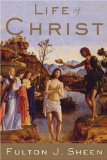It’s a book that can rightfully claim the title of a “classic”. First written in 1958, Bishop Fulton J. Sheen’s Life of Christ is a walk through the events of, well, the life of Christ. It is classic Sheen – simultaneously erudite and approachable, orthodox without being overbearing.
 One of the great beauties of this book is that it is unapologetic. By that I mean not that it does not defend the Catholic faith, but rather that it does so with the easy confidence so typical of Bishop Sheen. If the Bible says Jesus said something, he said it and we just move on; similarly if tradition says something happened a particular way it is simply stated and the story moves on. There is no dithering with possible alternate conclusions or attempting to psychoanalyze either Jesus or His companions. Surely there will be those who disagree with some element or another of his biblical scholarship (acknowledging that he relied heavily on the work of Scripture scholar Msgr. Myles Bourke) they cannot deny that his conclusions have a firm grounding in both academic study and tradition. The relief of reading this easy confidence is palpable when compared with much that passes for modern scripture scholarship which is too weighted down with, as Pope Benedict would say, the hermeneutic of suspicion rather than lifted up by the hermeneutic of trust. Bishop Sheen trusted the Bible and the Church, and it shows on every page.
One of the great beauties of this book is that it is unapologetic. By that I mean not that it does not defend the Catholic faith, but rather that it does so with the easy confidence so typical of Bishop Sheen. If the Bible says Jesus said something, he said it and we just move on; similarly if tradition says something happened a particular way it is simply stated and the story moves on. There is no dithering with possible alternate conclusions or attempting to psychoanalyze either Jesus or His companions. Surely there will be those who disagree with some element or another of his biblical scholarship (acknowledging that he relied heavily on the work of Scripture scholar Msgr. Myles Bourke) they cannot deny that his conclusions have a firm grounding in both academic study and tradition. The relief of reading this easy confidence is palpable when compared with much that passes for modern scripture scholarship which is too weighted down with, as Pope Benedict would say, the hermeneutic of suspicion rather than lifted up by the hermeneutic of trust. Bishop Sheen trusted the Bible and the Church, and it shows on every page.
The book is certainly not a single-sitting type, at least not for the average reader, weighing in at 658 pages. Yet the reading is generally light and the pace just quick enough to befit the greatest life ever lived. As I wrote above, Bishop Sheen never allows himself to get trapped in the theological minutiae of some part of Christ’s life and in a few cases will refer the reader to alternate books which treat a particular subject in greater detail.
Would I recommend this book? If you’re a Scripture scholar you may find it light reading and its lack of deference to modern scholarship off-putting, but then you also should have a certain deference to the traditions of reading the Bible which this book exemplifies. If you are an avid Communist or a great fan of Freudian psychoanalysis you may find many of his allusions to these ideologies grating, but then you should at the very least understand them so as to be able to address them or perhaps be changed by them. If you’re someone who loves the Bible and is willing to be led along by the hand in a walk through the Gospels, I’d recommend this book in a heartbeat. If you have the time, I’d go one step further and recommend you read this book back-to-back with Pope Benedict’s Jesus of Nazareth as they complement each other extraordinarily well. After reading this you may not read the Gospels quite the same way again.
Update: I meant to add this quote when I originally wrote the review. It’s typical of the rest of the book in that it is both insightful and counter-intuitive in that it turns our normal consideration of the Sermon on the Mount from an idyllic passive occurrence to one which was directly responsible for His death:
The Sermon on the Mount is so much at variance with all that our world holds dear that the world will crucify anyone who tries to live up to its values. Because Christ preached them, He had to die. Calvary was the price he paid for the Sermon on the Mount. Only mediocrity survives. Those who call black black, and white white, are sentenced for intolerance. Only the grays live.





